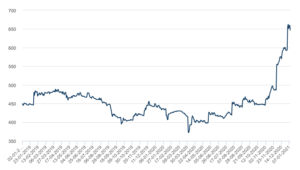- Iron ore fines prices traded this week at $US172.25 per tonne, up $US6.95 on a week ago
- Hard coking coal prices were steady on-week at $US94 per tonne at Queensland ports
- China’s reinforcing bar price is at $US695 per tonne, up $US3 per tonne on a week ago
The price of iron ore for delivery to China has surged nearly $US7 per tonne in a week to $US172.25 per tonne ($223.50/tonne), a nine-year high.
Competitor iron ore from Brazil is trading at $US193.70 per tonne in the Chinese market and is about $US20 per tonne more than Australian ore, according to Metal Bulletin.
Iron ore futures traded on the Singapore Exchange remain at buoyant levels, with the February derivative contract trading at $US167.25 per tonne.
Analysts expect iron ore prices to trade around $US180 per tonne in the months ahead, given ongoing supply issues in Brazil and rising Chinese demand.
“With steel prices continuing to lift further through December, and steel inventories rising only modestly, it appears that strong steel sales will continue to be supportive of high iron ore prices at least into the first half of 2021,” Westpac bank commodity analyst Justin Smirk told the Australian Financial Review.
Iron ore stocks steady at Chinese ports ~125 million tonne
Chinese ports had 125 million tonnes of stockpiled iron ore last week, and port stocks have been above this level since October 2020, reported S&P Global Platts.
This stockpile volume sounds considerable, although at China’s current production rate for steel it would be consumed within a few days.
China’s steel industry is producing 200 million tonnes per week, or 1.1bn tonnes on an annualised basis, according to market experts.
One tonne of steel uses approximately 1.6 tonnes of iron ore, and therefore 125 million tonnes of iron ore would produce about 80 tonnes of steel.
Shipments of iron ore from Brazil have been trimmed by various operational issues, including two separate dam failures at different mine sites.
There are positive signs that the South American country’s output is recovering, and BHP (ASX:BHP) said in a Christmas notice it would restart production at the Germano and Ubu complexes operated by its Samarco unit in Brazil.
Samarco is a 50:50 joint venture with Vale and production at Germano and Ubu have been halted since 2015 after a dam broke at its Germano mine.
Brazilian miner Vale said in a recent market update its ore production would reach 330 million tonnes in 2021, after it came in at 310 million tonnes for 2020.
Brazilian exports seen at ~360 million tonnes in 2021
Norwegian investment bank Cleaves Securities is forecasting a rise of 24 million tonnes in Brazil’s iron ore exports this year, according to reports.
“We expect 360 million tonnes in 2021, up from 336 million tonnes in 2020,” Cleaves Securities chief analyst, Joakim Hannisdahl told Shipping Watch.
For Australia, export volumes for iron ore are forecast to increase by 22 million tonnes this year, said the bank.
Australian iron ore exports will increase to 899 million tonnes in 2021, up from 877 million tonnes in the 2020 year, Hannisdahl said.
This estimate for Australian iron ore exports may be on the conservative side, based on latest available data for WA shipping ports.
In the 2020 year, iron ore exports from the Pilbara in WA reached 874.2 million tonnes, the West Australian newspaper reported, quoting an anonymous ‘well-informed industry source’.
The 2020 export figure is up 3 per cent from 2019’s volume of 849 million tonnes, and has eclipsed 2018’s shipment record of 851 million tonnes.
The Pilbara shipping hub includes the ports of Cape Lambert, Dampier and Port Hedland for which the largest shippers of iron ore are BHP, Fortescue Metals Group (ASX:FMG), Rio Tinto (ASX:RIO) and Hancock Prospecting’s Roy Hill operation.
Iron Road kicks off South Australia green iron pellet project
ASX iron ore company Iron Road (ASX:IRD) has started planning for a ‘green’ manufacturing precinct for iron ore at Cape Hardy port fuelled by hydrogen.
The plant will produce ‘green’ iron ore pellets using high-grade iron ore concentrate from Iron Road’s Central Eyre Iron Project (CEIP) in South Australia.
The project has attracted investment from Mitsubishi Heavy Industries, a specialist engineering and technology company based in Japan.
Hydrogen Utility (H2U), a leading developer of green hydrogen projects in Australia is also on board for the project at the 1,100 hectare Cape Hardy port site.
“Mitsubishi Heavy Industries’ investment in H2U recognises South Australia as the leading economy, globally, in the integration of variable renewable energy into its electricity generation mix,” said Iron Road.
The project will use renewable energy sources in the Eyre Peninsula to produce green hydrogen and green ammonia to decarbonise minerals processing.
“An early mover business model also lays the foundation to export locally-produced green hydrogen, green ammonia and processed mineral commodities such as green iron ore pellets to Japan and other destinations,” said the ASX company.
Production of green hydrogen and ammonia in South Australia is expected to start toward the end of 2022, and the CEIP is expected to have a production capacity of 12 million tonnes per year basis 66.7 per cent iron for its pellets product.
ASX iron ore company share prices
Steel rebar prices edge higher in China
Chinese prices for steel reinforcing bar (rebar) used in construction and infrastructure projects has climbed again this week to almost $US700 per tonne.
At the Shanghai steel trading hub, rebar products were heard to change hands at $US695 per tonne, compared with $US692 a week ago.
On the London Metal Exchange, prices for its rebar contract for month ahead delivery peaked around $US660 per tonne last week and are heading lower.
Prices for the steel rebar contract took off in late October from their previously rangebound level of $US445 per tonne, according to LME data.
Higher iron ore prices have steadily eroded profit margins for steel producers including in China, and end users have started to resist further price increases.
“Considering [the] off-peak season has arrived, the market will not accept high profit margins for steel products,” reported Reuters, quoting a note from analysts at Chinese firm Huatai Futures.

Slight increase forecast in Chinese steel production
China’s construction sector is motoring along on a wave of investment capital and government stimulus rushed out to counteract last year’s COVID-19 pandemic.
Demand in the construction market for steel products is likely to stay robust into February before winding down for the Lunar New Year holiday next month.
“Based on our rough estimation, there will be a net increase of more than 40 million tonnes per year of crude steel capacity in 2021,” a Chinese steel trader told Argus Media.
Steel production in China is forecast at 1.06 billion tonnes this year, representing a marginal increase on 1.05 billion tonnes last year, said Argus Media.
China is to launch a trading scheme for carbon emissions on February 1, that may start to impact some Chinese steel production, said reports.
Hard coking coal prices steady at Australian ports
Thin transaction volumes were heard for Australian coking coal in the Chinese spot market this week as buyers switched their interest to other origins.
Cargoes of Australian hard coking coal for February shipment had a spot price of $US94 per tonne at Queensland ports this week, according to Metal Bulletin.
Buyers from India and other Asian nations have steeped into the void left by Chinese buyers in the free-on-board (FOB) market for Australian cargoes.
“Major coal miners in Australia did not offer any spot cargoes this week, so the FOB market has been very quiet,” a Singapore-based market participant told Metal Bulletin on Friday.
A single bid was heard for a February shipment of premium quality Australian hard coking coal at $US98 per tonne FOB Queensland, it said.
The FOB price represents the price paid for a cargo loaded into a vessel at port, and does not include shipping or insurance costs for the cargo.
Futures prices for Australian coking coal have shifted lower in recent weeks as the threat of cyclones interrupting Queensland shipments has dwindled.
For February settlement, the CME’s futures contract was trading at $US120 per tonne, while the March contract traded at $US132 per tonne, said CME data.
North American cargoes continue to set traded prices for hard coking coal landed in China, despite Australian cargoes offering a cheaper option for buyers.
Two trades were reported for premium quality hard coking coal at Chinese ports at around $US210 per tonne including freight costs.
Meanwhile, the delivered-China price for equivalent Australian cargoes was only $US115 per tonne, reported China-based price assessment agency My Steel.
Chinese steel producers are continuing to source coking coal for their blast furnace steel production from countries such as Canada, Russia, Mongolia and the US.
There are five ASX-listed coal producers that have operations in Canada, namely, Allegiance Coal (ASX:AHQ), Atrum Coal (ASX:ATU), Jameson Resources (ASX:JAL) and Montem Resources (ASX:MR1) and Pacific American Holdings (ASX:PAK).
Aspire Mining (ASX:AKM) is fast-tracking the development of its Ovoot coking coal project in Mongolia on China’s northern border.
Tigers Realm Coal (ASX:TIG) is expanding its Russian coal operation that ships from the Pacific port of Beringovsky to customers in China, Japan and Korea.
ASX coal company share prices
South 32 ready to walk away from Queensland coal project: report
Australian mining company South 32 (ASX:S32) has reportedly decided to ‘walk away’ from a 50 per cent-owned coking coal mine project in Queensland.
A report in The Australian newspaper Tuesday said South 32 is “set to announce it will not pursue development of the $1.5bn project after considering the results of a feasibility study delivered last year”.
The ASX company is believed to be considering options for the sale of its 50 per cent share in the Eagle Downs project, the report said.
South 32 acquired its half-share in the Eagle Downs project in Queensland’s Bowen Basin coalfield in 2018 for an upfront payment of $US106m.
A further payment of $US27m is due this year under the deal, taking the total sale price to $US133m ($173m).
Eagle Downs was placed into care and maintenance in mid-2015 and a feasibility study had been commissioned by South 32 for its development.
“Subject to the findings of that study and requisite approvals, South 32 in partnership with Aquila plan to construct a multi-seam underground longwall metallurgical coal mine and processing plant with a dedicated rail spur and train load-out facility,” said South 32 in a 2018 statement.
Prior work undertaken by Aquila indicated Eagle Downs could produce 4.5 million tonnes per year of export quality hard coking coal over an initial 10 years.
The remaining half share in Eagle Downs is held by Aquila Resources, a subsidiary of Chinese steel company BaoWu, and was acquired by the company in 2014.
Fonte: Stockhead





